Guard dogs are canines that protect and safeguard people, property, and things. Guard dogs are typically instinctual based on breed and natural tendency, but some breeds can be trained more than others. Some canines can be trained to obey commands only ordered by their master and taught to ignore strangers. Though many folks want a guard dog for reasons of their own, the question we should all ask before is do I need a guard dog?
Guard Dog or Watch Dog?
We should begin with a basic understanding of the primary differences between a guard dog and a watch dog. A watch dog is meant to act as an alarm, to alert you when an intruder is breaking and entering, or when something fishy is going on. A guard dog does this as well but goes one step beyond and serves as the first line of defense when a situation presents itself. Put differently, guard dogs are expected to engage and attack when a threat is perceived.
Most folks considering a guard dog might only need the level of training a watch dog meets. A companion who oversees the domain and notifies the owner when needed. However, if you find yourself needing more, consider a guard dog. Most guard dog owners typically fall into several groups, like farmers, or owners of livestock or large tracts of land. Others include people with expensive assets at home or at the work, or people who live in areas where crime poses a real danger.
If you are considering a guard dog, keep in mind, your dog will change. Unlike household pets, your guard dog will be queued up to react to signals and surroundings. Also keep in mind guard dogs have been known to make mistakes and attack innocent bystanders. Reports of children whom are either making too much noise or accidentally stepping into a yard to retrieve a ball, only to step onto the guard dog’s territory, have been attacked. Incidents like these also happen to the best and most professional guard dogs, with police dogs biting the wrong person or not letting go when commanded. Owners are ultimately responsible for their dog’s behavior at all levels.
Still set on a guard dog, or maybe a watch dog? Both guard dogs and watch dogs require training, so read on to learn more.
Training will Shape Your Dog
Guard dog training is not as easy as teaching your dog simple tricks like rolling or paw, or even building responses to simple obedience commands. It is a complicated exercise, which ultimately molds your dog and affects their future being. Dog training schools are even available if you want to take training seriously, where your dog and you spend time with a professional.
Before your dog is accepted into a training program, they are evaluated based on their temperament. Guard dogs exhibit loyalty, obedience, and responsiveness beyond the normal household pet and professionals can gauge early on whether a dog is trainable or not. Breed has much to do with the process, but individual characteristics also play a major role in the decision making.
Once accepted, the dog training school may require that your dog stays in the training facility for the duration of the watchdog training program. If the dog is brought home every day after training, it can hamper the intensive training process.
Dogs are first trained in basic obedience. Although you think your dog is obedient when executing a given command on the second or third time, it is still not considered valid. Guard dogs must immediately follow any order on the first request. Even if your dog has received basic obedience training or some form of training prior, the trainer should be checking to ensure the canine can adequately respond to given commands.
The duties of a guard dog are given and taught to the dogs in forms of lessons and classes. They are trained not to accept treats or to follow instructions from anyone but their owner or master. This training becomes ineffective if the dog follows commands given by a stranger to sit and stay or if the dog openly accepts treats from a stranger.
Dogs are trained for specific needs and different purposes. If you wish to be alerted of illegal entry into your property, your dog will be trained to bark and return to you to notify you of the presence of strangers on your property. The owner must recognize and understand the dog’s actions every time to preserve the dog’s knowledge and response. This process can be repeated several times as practice and reinforcement.
Protective dogs trained to protect the owner are trained to attack the intruder if there is a legitimate threat or the owner orders them. For this reason, watchdogs who have received this level of training should not be left unattended, as they may attack if they perceive threats or actions by visitors.
Dogs are also trained to be sensitive to quiet noises to ensure that the dog is not dissuaded by an intruder’s hand gestures or hushing sounds. In conjunction with this, trainers teach watchdogs to interact in harmony with other family members and other pets.
Top 10 Best Breeds for Guard Dogs
Debated all over the world, the discussion on which dogs are the best caretakers is a century old conversation. Some experts only judge the effectiveness of the dogs by the outcome of their results and responses while others work exclusively with certain breeds. Most popular lists are regional. As you can guess, this results from geographies feeling a sense of pride for the dog’s native to their land.
In England, the big terriers are at the top of the list while the rest of Europe prefer more traditional dogs like the German Shepherds and Doberman Pompoms. American lists are likely to include Pit Bull Terriers while the Japanese like the Tosa Inu. The top ten list below weighs many factors and considers guard dogs from around the world.
1. German Shepherd
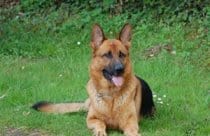 German shepherd dogs, one of the most registered breeds in the world, are a relatively new breed of dog whose origins date back to 1899. They were originally bred for shepherds, which gave them a race shaped design as well as a desire to learn and to perform tasks with meaning. Because of their strength, intelligence, and skill in obedience training, they are often used in police and military functions. Shepherds are loyal to nature and connect well with the people they know. Most expert dog lists have the German Shepherd at least in their top five pick.
German shepherd dogs, one of the most registered breeds in the world, are a relatively new breed of dog whose origins date back to 1899. They were originally bred for shepherds, which gave them a race shaped design as well as a desire to learn and to perform tasks with meaning. Because of their strength, intelligence, and skill in obedience training, they are often used in police and military functions. Shepherds are loyal to nature and connect well with the people they know. Most expert dog lists have the German Shepherd at least in their top five pick.
2. Doberman Pinscher
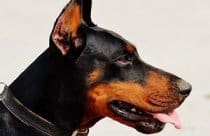 Dobermans are one of the most common breeds of domestic animals. They are known to be intelligent, caring, and faithful as a companion dog. The Pinscher is a family of short-haired dogs, compactly built with great power and speed. They are a proud breed, very attentive, determined, with an obedient temperament. Although television and movies portray the wide use of the Doberman as watch dogs, guard dogs or police dogs, they are less common nowadays.
Dobermans are one of the most common breeds of domestic animals. They are known to be intelligent, caring, and faithful as a companion dog. The Pinscher is a family of short-haired dogs, compactly built with great power and speed. They are a proud breed, very attentive, determined, with an obedient temperament. Although television and movies portray the wide use of the Doberman as watch dogs, guard dogs or police dogs, they are less common nowadays.
3. Rottweiler
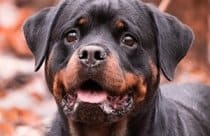 The Rottweiler is a medium-sized breed native to Germany as a grazing dog. It is a robust and very intelligent breed with well-developed genetic and pastoral instincts. Their high intelligence often leads them to boredom, which can result in potentially dangerous behavior. If the dog deviates from training or is left alone, their raw power can destroy furniture, wood flooring, and even cabinetry. The mishandling of Rottweilers is often due to negligence, abuse, or lack of socialization and proper training.
The Rottweiler is a medium-sized breed native to Germany as a grazing dog. It is a robust and very intelligent breed with well-developed genetic and pastoral instincts. Their high intelligence often leads them to boredom, which can result in potentially dangerous behavior. If the dog deviates from training or is left alone, their raw power can destroy furniture, wood flooring, and even cabinetry. The mishandling of Rottweilers is often due to negligence, abuse, or lack of socialization and proper training.
4. Bullmastiff
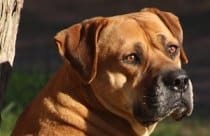 The Bullmastiff is a powerful dog that was originally a cross between the English Mastiff and the old English bulldog. Originally bred to find and immobilize poachers, the breed has become popular as a family dog. A Bullmastiff can be bold and self-confident, but docile. It has a strong protective instinct and defends itself against any threat to its owners or threats to its territory. Their protective instinct coupled with their natural caution of strangers and large size means that early training in socializing and obedience is essential.
The Bullmastiff is a powerful dog that was originally a cross between the English Mastiff and the old English bulldog. Originally bred to find and immobilize poachers, the breed has become popular as a family dog. A Bullmastiff can be bold and self-confident, but docile. It has a strong protective instinct and defends itself against any threat to its owners or threats to its territory. Their protective instinct coupled with their natural caution of strangers and large size means that early training in socializing and obedience is essential.
5. Rhodesian Ridgeback
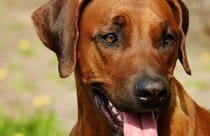 The Rhodesian ridgeback is a breed originally from South Africa. The characteristic feature of the Ridgeback is the hairline along the back, which runs in the opposite direction to the rest of their coat and is typically muscular with a light coat that should be short, dense, smooth and shiny in appearance and not wooly or silky. Ridgebacks are loyal and intelligent, and often unknown to those outside of dog circles. A Ridgeback with the right temper tends to ignore a stranger rather than challenge him. This breed requires positive training based on reward, good socialization and consistency, and is often not the best option for inexperienced dog owners.
The Rhodesian ridgeback is a breed originally from South Africa. The characteristic feature of the Ridgeback is the hairline along the back, which runs in the opposite direction to the rest of their coat and is typically muscular with a light coat that should be short, dense, smooth and shiny in appearance and not wooly or silky. Ridgebacks are loyal and intelligent, and often unknown to those outside of dog circles. A Ridgeback with the right temper tends to ignore a stranger rather than challenge him. This breed requires positive training based on reward, good socialization and consistency, and is often not the best option for inexperienced dog owners.
6. Puli
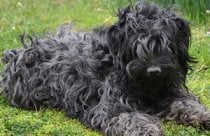 The Puli is an average sized guard dog, much like the Komondor. Their coat is long and heavy like that of the Komondor’s but differs in color slightly and tends to be darker. Some associate Puli’s as “moving mops” given their look. The Puli is an intelligent and agile dog used for both herding and livestock guarding. They are very loyal and easy to train. Many owners are surprised by how much energy Puli’s have and their ability to stay active for an entire day. If you are considering a Puli, take their abundant liveliness into account.
The Puli is an average sized guard dog, much like the Komondor. Their coat is long and heavy like that of the Komondor’s but differs in color slightly and tends to be darker. Some associate Puli’s as “moving mops” given their look. The Puli is an intelligent and agile dog used for both herding and livestock guarding. They are very loyal and easy to train. Many owners are surprised by how much energy Puli’s have and their ability to stay active for an entire day. If you are considering a Puli, take their abundant liveliness into account.
7. Komondor
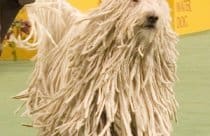 The Komondor is a large dog of Hungarian origin, covered with large cord hair and a strong body. The Komondor is a natural guard used to protect livestock and property. These dogs were almost completely destroyed during the Second World War when Germans and Russians had to kill them before invading the homes they invaded.
The Komondor is a large dog of Hungarian origin, covered with large cord hair and a strong body. The Komondor is a natural guard used to protect livestock and property. These dogs were almost completely destroyed during the Second World War when Germans and Russians had to kill them before invading the homes they invaded.
8. Giant Schnauzer
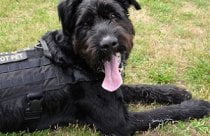 The Giant Schnauzer is a large dog that works well in defined conditions. They are a quiet and versatile working dog, always with its owner. The Giant Schnauzer is easy to train and responds to consistent and firm behavior. The key to this breed is to understand that all other people around them are higher in the group. The Giant Schnauzer lives in a herd mentality, and it is important to be consistent with this dog in order to remain a great watchdog.
The Giant Schnauzer is a large dog that works well in defined conditions. They are a quiet and versatile working dog, always with its owner. The Giant Schnauzer is easy to train and responds to consistent and firm behavior. The key to this breed is to understand that all other people around them are higher in the group. The Giant Schnauzer lives in a herd mentality, and it is important to be consistent with this dog in order to remain a great watchdog.
9. American Akita
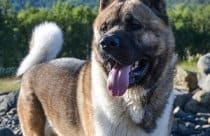 The American Akita, separate from the Akita Inu, is a large dog breed from the mountains of Japan. The Akita is a gorgeous conspicuous dog with the appearance of strength and nobility. Physically, these dogs have been trained for the cold. They have luxuriously thick coats and big bear heads. They are very affectionate, loyal and very territorial. They tend to be socially dominant over other dogs, reserving barkers, and can be difficult to train. But unlike the Tosa Inu, the Akita is ideal for families looking for more than just a guard dog.
The American Akita, separate from the Akita Inu, is a large dog breed from the mountains of Japan. The Akita is a gorgeous conspicuous dog with the appearance of strength and nobility. Physically, these dogs have been trained for the cold. They have luxuriously thick coats and big bear heads. They are very affectionate, loyal and very territorial. They tend to be socially dominant over other dogs, reserving barkers, and can be difficult to train. But unlike the Tosa Inu, the Akita is ideal for families looking for more than just a guard dog.
10. Tosa Inu
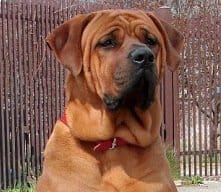 Tosa Inu is a majestic and massive dog. The Tosa was born and raised in Japan for centuries and is surprisingly athletic and agile although their large size might indicate otherwise. With a big head and a big skull, it has a big mouth with very strong jaws. The large size and the deep bark of this dog are an excellent deterrent for intruders. Tosa Inus are crosses between the Great Danes, St. Bernards and the Mastiffs, and they were created to be big fighting dogs. They are very intelligent and do not need repetitive training. But when they grow into their full size, they should not be left alone with children or small pets without supervision.
Tosa Inu is a majestic and massive dog. The Tosa was born and raised in Japan for centuries and is surprisingly athletic and agile although their large size might indicate otherwise. With a big head and a big skull, it has a big mouth with very strong jaws. The large size and the deep bark of this dog are an excellent deterrent for intruders. Tosa Inus are crosses between the Great Danes, St. Bernards and the Mastiffs, and they were created to be big fighting dogs. They are very intelligent and do not need repetitive training. But when they grow into their full size, they should not be left alone with children or small pets without supervision.
Although Pit Bulls are a popular dog for many households, many professionals do not believe they make good watchdogs due to their chaotic temperament and spontaneous behavior. Combined with how powerful these dogs can be, this might not be the best choice for first time dog owners. Pit Bulls can be very loving dogs and an excellent deterrent watchdog, be aware of the challenges associated with training this breed if you decide to take on the task.
Key Takeaways
If you believe you need a guard dog or watch dog, be selective based on temperament, size, history of the breed and ability to be trained. Also consider how much time and money you are willing to spend on training. When selecting a dog, it is, of course, important to prefer a dog that is not overly hostile and will obey you. More importantly, however, is how one trains a potential guard dog or watch dog. To avoid injury to innocent bystanders, it is important that you exercise diligence and intent, and properly train and teach your dog. At the end of the day, no matter how much training dogs go through, they are still dogs at heart and will need your love and attention!
